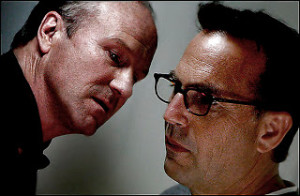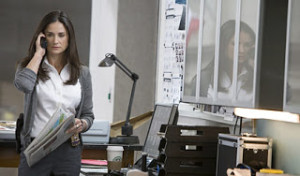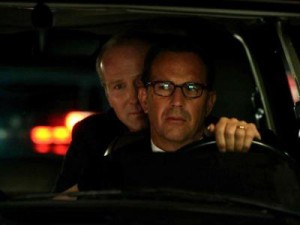One of the problems with psychological thrillers, specifically those involving serial killers, is that the bar has been set far too high for new attempts to measure up. Consider “Se7en” the story of a serial killer who kills based on the Seven Deadly Sins, with masterful performances by Kevin Spacey, Morgan Freeman, and Brad Pitt. Consider also, other additions to the genre: “Silence of the Lambs,” featuring the eerily adept acting of Anthony Hopkins as its chief villain, and “Along Came a Spider,” once again showcasing the skills of Morgan Freeman. However, another reason for audiences’ exhaustion with the genre lies simply in its overabundance. Less renowned films, such as “The Bone Collector,” “Insomnia,” “Zodiac,” and Jack Nicholson’s “The Pledge” litter an already supersaturated field with mind-boggling numbers. However, there can be no ignoring the fact that Hollywood’s fascination with these films shows no signs of abating.
Given this, it’s no surprise that “Mr. Brooks,” released in 2007, had its work cut out for it upon reaching theatres. With a budget of $20M, it earned a modest $28M in its box office run, and failed to garner the attention of some major critics, such as Chicago Sun-Times’ Roger Ebert, and remained sort of unheard of. However, a chance viewing at a friends’ house led me to discover this gem, and to be impressed with a film that delivers on all levels. “Mr. Brooks” is emotive, dramatic, psychologically troubling and a tragically unique look at the mind of a serial killer.

“Mr. Brooks” stars Kevin Kostner in one of the best roles I had seen him in. He plays the titular character, Earl Brooks, who is a success in all matters. He runs a successful box company, has a beautiful wife and daughter, and has just been named Portland, Oregon’s “Man of the Year” for his business success and philanthropy. A scene in the opening shows Mr. Brooks giving an acceptance speech, pausing to blow a kiss to his wife, teary-eyed. It’s clear there’s a tender part of Mr. Brooks’s life the Portland community isn’t part of and really isn’t aware of. However, there’s another part of Mr. Brooks that no one, not even his devoted wife is privy too: He’s a vicious monster and serial killer, addicted to a sinister lifestyle as “The Thumbprint Killer.”
However, we meet Mr. Brooks in a particularly abject period in his life. It has been 2 years since he last killed; he swears off his addiction, vowing to lead a normal, legal, and healthy life. Along the way, we see, he is fought by his inner-psyche and alter ego (played magnificently by William Hurt, of “The Village” fame) who urges him to give into his demons and kill again. His alter-ego tempts him in various milieus, from his posh home, to his office, to even an Alcoholics Anonymous meeting where Earl goes for support. “I’m an addict,” he says.
 His hypocrisy is self-evident, as is his frailty. In another scene he narrates, “I don’t do this because I enjoy it…I do this because I’m addicted to it.” While this had the potential for satire, or even comedy, Director Bruce Evans (“Stand by Me“) uses it to soften Mr. Brooks. He’s not an anti-hero, but he’s not really an antagonist. As a result, you can’t help but sympathize, almost perversely, with Earl as the movie progresses.
His hypocrisy is self-evident, as is his frailty. In another scene he narrates, “I don’t do this because I enjoy it…I do this because I’m addicted to it.” While this had the potential for satire, or even comedy, Director Bruce Evans (“Stand by Me“) uses it to soften Mr. Brooks. He’s not an anti-hero, but he’s not really an antagonist. As a result, you can’t help but sympathize, almost perversely, with Earl as the movie progresses.
The film takes a turn when Mr. Brooks’ latest crime is witnessed by a pesky (and perverted) peeping tom who we come to know as simply “Mr. Smith.” Playing Mr. Smith is Dane Cook, in a wholly welcome departure from slapstick comedies such as “Good Luck Chuck” and “Waiting.” He plans to blackmail Mr. Brooks. However, in another departure from normality, it isn’t for money but for something far more sinister. He wants Mr. Brooks to kill again so he can come along for the rush of the kill.
 Solid acting all-around is what makes “Mr. Brooks” both an insightful psychological yarn and a frightening movie to behold. Mr. Smith’s desire to be the willing apprentice, contrasted with Mr. Brooks’ forced role as teacher makes for both taut and tragic scenes. We learn two things from this, one, that Dane Cook can act quite well when the situation calls for it, and that Kostner and Hurt have terrific chemistry.
Solid acting all-around is what makes “Mr. Brooks” both an insightful psychological yarn and a frightening movie to behold. Mr. Smith’s desire to be the willing apprentice, contrasted with Mr. Brooks’ forced role as teacher makes for both taut and tragic scenes. We learn two things from this, one, that Dane Cook can act quite well when the situation calls for it, and that Kostner and Hurt have terrific chemistry.
Dialogue between Mr. Brooks and his alter-ego are shot in such a way where you get the impression he’s having dialogue with a whole other person – and not merely himself. When Mr. Brooks gets off on killing, or is thinking his way out of being caught, his alter-ego glows with joy. However, when he questions why he kills, and makes plans to stop once and for all, his alter-ego despises it, fighting him harder and harder. The back and forth between Kostner and Hurt is impressive to see, and one of the finer points of an already terrific movie.
It’s really not hard to recommend “Mr. Brooks.” In fact it’s really hard not to. It has terrific acting – Kostner, Hurt, Demi Moore (as hot-on-Brooks’ trail Detective Atwood) and even Danielle Panabaker (“Friday the 13th”) who plays Brooks’ daughter, turn in exceptional performances.
 The plot is dramatic, while at the same time terrifying, and the filmmakers paint a rather original plot by telling the story not from the law’s point of view, as in “Seven” or “Silence of the Lambs” but from that of Mr. Brooks. Character development for all involved, especially for Brooks, Atwood, and Mr. Smith, is, again, top-of-the-line.
The plot is dramatic, while at the same time terrifying, and the filmmakers paint a rather original plot by telling the story not from the law’s point of view, as in “Seven” or “Silence of the Lambs” but from that of Mr. Brooks. Character development for all involved, especially for Brooks, Atwood, and Mr. Smith, is, again, top-of-the-line.
For a movie about the danger of failing to tie up loose ends, “Mr. Brooks” covers every angle, delivering a power-punched 1st and 2nd act, and a 3rd act that keeps you guessing until the very end. The film may not be your standard Halloween slasher fare, but if you want a solid horror film to entertain as well as send shivers up your spine, you’d be hard pressed to do better than “Mr. Brooks.”
– by Mark Ziobro



2 Comments
You right on . This is one truly one excellent movie.
Your right on this is truly a great movie.